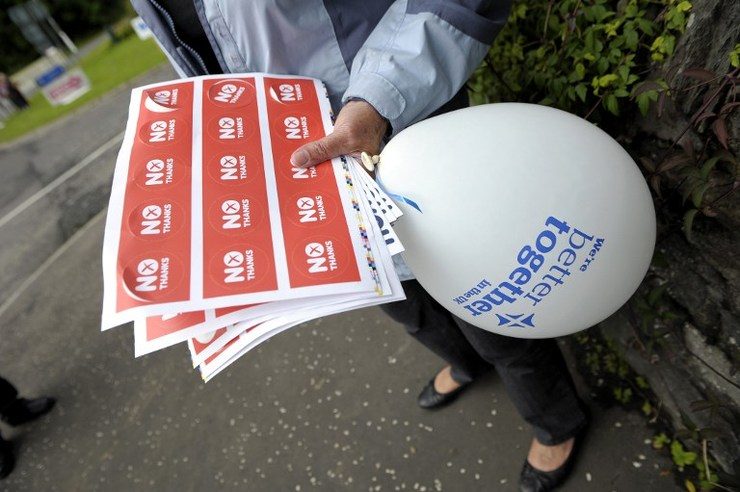SUMMARY
This is AI generated summarization, which may have errors. For context, always refer to the full article.

LONDON, United Kingdom – Supporters of keeping Scotland in the UK were gearing up on Monday, September 8, to mount a fightback as buoyant separatists claimed they had the momentum ahead of next week’s referendum on independence.
Following a poll on Sunday, September 7, that put the pro-independence “Yes” camp ahead for the first time in the lengthy campaign, unionists are planning this week to unveil detailed plans for greater fiscal autonomy for Scotland if it votes on September 18 to retain the 300-year-old union with England.
Conservative British Prime Minister David Cameron, who spent the weekend with Queen Elizabeth II at her Scottish summer retreat, will try to convince skeptics that Edinburgh would swiftly get more powers following a “No” vote.
Meanwhile the Labour opposition is to deploy some of its biggest names in a bid to halt the apparent nationalist surge.
Party leader Ed Miliband is expected to appear on a platform with his Scottish predecessor, former prime minister Gordon Brown, for the first time since the failed 2010 general election campaign.
Meanwhile their finance spokesman Ed Balls, due to speak in the oil city of Aberdeen, urged Scots not to vote for independence as a protest against Cameron’s Conservative-led UK government.
Cameron’s center-right Tories are a distant third in the Scottish Parliament behind the separatist, left-of-center Scottish National Party (SNP) of First Minister Alex Salmond, and center-left Labour.
‘Act of self-mutilation’
The moves come after a YouGov poll in The Sunday Times newspaper gave the pro-independence “Yes” camp 51% support compared to the “No” camp’s 49%, excluding undecided voters. Six percent said they had not made up their minds.
The “No” camp had been ahead in the polls, though surveys show the gap has shrunk in recent weeks.
Any vote for Scotland to leave the UK would raise questions about Britain’s standing in the international community.
Scotland represents one-third of Britain’s landmass and is home to Britain’s prestige submarine-based Trident nuclear deterrent, which the SNP says must be out of an independent Scotland by 2020.
London Mayor Boris Johnson urged Scots to keep the union intact, warning that independence would be “an utter catastrophe for this country”.
“We will all have lost a way of thinking about ourselves, a way of explaining ourselves to the world,” the Conservative wrote in The Daily Telegraph newspaper.
“We are on the verge of trashing our global name and brand in an act of self-mutilation that will leave our international rivals stunned, gleeful and discreetly scornful.”
Conservative British finance minister George Osborne said the debate had shown Scots clearly wanted greater autonomy.
“You will see in the next few days a plan of action to give more powers to Scotland. More tax powers, more spending powers, more plans for powers over the welfare state,” he told BBC television on Sunday.
“Then Scotland will have the best of both worlds.”
‘Clear panic’
Salmond dismissed Osborne’s move as a “panic measure” and claimed the momentum was now “decisively with the ‘Yes’ campaign”.
“The Westminster elite are losing this campaign… we’ve got them on the run,” he told BBC television.
He said there was “clear panic in the ‘No’ campaign. They’ve failed to scare the Scots; now they’re trying to bribe us”.
Labour has been the dominant force in Scottish politics since the 1960s and as part of their push, Miliband was due to say efforts to transfer more powers from London to Edinburgh should begin immediately after a “No” vote.
Speaking to the Trades Union Congress in Liverpool, northwest England, Miliband was to argue that voting against “separation is also about saying yes to more devolution” which will see “more decisions being made in Scotland, by Scots, with a stronger Scottish Parliament, with more powers guaranteed”.
However, the SNP’s Derek Mackay said one in three Labour voters in Scotland was planning to vote “Yes”.
“A ‘Yes’ vote is our one opportunity to be rid of Tory governments we didn’t vote for and to make our country a fairer, more equal place for everyone who lives here,” he said. – Rappler.com
Add a comment
How does this make you feel?
There are no comments yet. Add your comment to start the conversation.